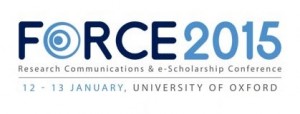 On Monday and Tuesday of this week (12th-13th January) I attended the Force2015 conference on research communications and e-scholarship. The conference was the successor to two US-based events entitled ‘Beyond the PDF’ – but happily for me, Force2015 was handily located in Oxford, in a venue about five minutes’ walk from my office.
On Monday and Tuesday of this week (12th-13th January) I attended the Force2015 conference on research communications and e-scholarship. The conference was the successor to two US-based events entitled ‘Beyond the PDF’ – but happily for me, Force2015 was handily located in Oxford, in a venue about five minutes’ walk from my office.
A major aim of the conference was to bring together people from a wide range of different sectors – researchers, publishers, funders, librarians, and more – so as one might expect, the programme covered a wide range of topics. Chris Lintott’s fascinating keynote on citizen science got things off to a strong start, but for me the most interesting discussion happened in the latter part of Tuesday morning, when there was a vision session (a series of flash talks where conference attendees had five minutes to present their idea for improving scholarly communication), followed by a panel session on academic credit.
Although these two sessions started from somewhat different perspectives, a common theme very rapidly emerged: that the way in which the outcomes of research are presented and assessed needs to change. The primary unit of academic communication (and the thing that matters most in terms of CV points for researchers) is still the traditionally published journal article. However, text-based articles aren’t the only result of scholarly endeavour, and we need to find new ways of enabling other research outputs – data, software, multimedia objects, and more – to become part of the formal research record. Alongside that, we need to rethink the way in which researchers are credited for the work they do (composing the actual text of an article is only one part of the scholarly process), and the value that is placed on each role. This echoes much of what the research data management community has been saying for some years now, though with an even broader scope – I hadn’t, for example, previously fully appreciated the importance of software as a research output in some fields.
However, while there was much useful debate, I was personally rather disappointed that non-science disciplines weren’t better represented, both here and elsewhere on the program. Social sciences popped up occasionally, but all too many of the sessions barely even acknowledged that the humanities existed. For a conference about the future of research communications to argue that the current model of scientific publishing doesn’t represent how research in that field actually works is entirely legitimate and much needed. But for much discussion at the same conference to proceed as if scientific research were the only sort that takes place is more than a little worrying.
At one point things almost seemed to be veering in the direction of claiming that papers weren’t really important at all, or that they were merely advertising for the real content. A question from the audience drawing attention to this produced some hasty backtracking, and assurances that the significance of the interpretation and conclusions provided by the text wasn’t being overlooked. Nevertheless, I couldn’t help feeling that the whole shape of the discussion might have been different if there’d been someone on the panel putting the perspective of the philosopher or the historian. (We were told a couple of times that Force11, the organization behind the conference, is making an effort to be more inclusive and to cover a wider range of disciplinary views: we can only hope that these labours will have borne more fruit by the time Force2016 rolls around.)
On a more positive note, I was at the conference with my Online Research Database Service (ORDS) hat on, with a poster and an accompanying demo. It was good to have the opportunity to show the system off to a group of interested people, and pleasing to get some excited responses. A major part of the reason for developing ORDS was to provide researchers with a straightforward way of sharing their data, both with collaborators and with the public, with a view to allowing the data to be recognized as a key resource in its own right – so it’s nice to feel we’re doing our bit to help bring about a revolution in scholarly communication.